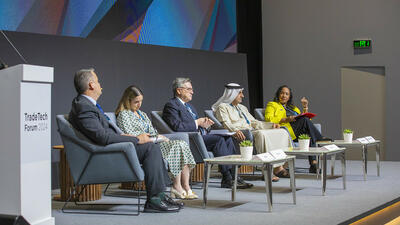Aid for Trade & the private sector
Enhancing companies’ ability to trade is a key element of national development agendas. In recent years, Aid for Trade has become the main vehicle for such investment in developing economies.
Aid for Trade provides a platform for governments to achieve some development policy aspirations through trade policy and investment. It is also where development partners, the private sector and civil society come together to work on trade development projects – creating jobs, attracting investment, and generating tax revenues. Clearly, businesses are among the beneficiaries of Aid for Trade investments: increased commercial opportunities through improved trade infrastructure, reduced cost of exporting goods, greater access to international markets, and empowerment through training and tools. When development objectives are taken into account, such as the economic empowerment of women and youth, and the environmental sustainability of the initiatives, then Aid for Trade contributes to fairer and more equitable trade.
Businesses, however, should not be seen simply as recipients, but as partners and advocates. Working side by side with development agencies and governments, business people can bring a pragmatic, local, market-driven perspective to the table, an essential ingredient for success.
The power of the private sector in economic growth and development are demonstrated nowhere more clearly than in China, where business has contributed greatly to the country’s shift to a market economy. As China celebrates its tenth year as a WTO member, ITC and the WTO marked the milestone with an event at which China’s chief negotiator for WTO accession reflected on the factors that have made the country the world’s second largest economy. At the event, WTO Director-General Pascal Lamy praised China’s example, noting the importance of leadership and a clear strategic vision in the WTO accession process.
Another WTO milestone took place in November: Russia completed its long-awaited accession to the organization, the 154th WTO member country and the last of the world’s large economies to join. The Russian economy has much to gain from this step, with one estimate, by economists David Tarr and Natalya Volchkova, predicting Russian GDP will increase by 3.3% annually in the short term.
In this issue of International Trade Forum, the private sector takes centre stage, with accounts from small-sized and micro-enterprises from the world’s farthest reaches, including a boat-making business in Kiribati, a cotton mill in Kenya, and a clothing maker in the Peruvian highlands. Ultimately, this is where all policy discussions must land – with real people striving to run a sustainable, profitable business.
As Dorothy Tembo points out in her article about the Enhanced Integrated Framework’s engagement with the dairy sector in Zambia, international development agencies and national governments are instrumental in kick-starting change, but it is the private sector that will build on that foundation to encourage economic growth at the local and global levels.















